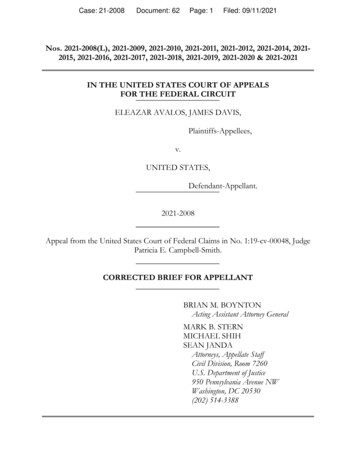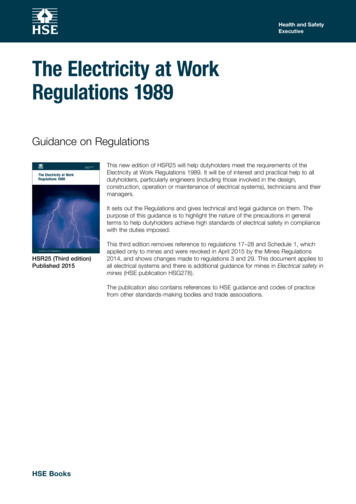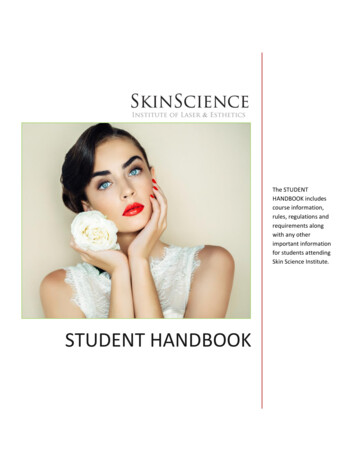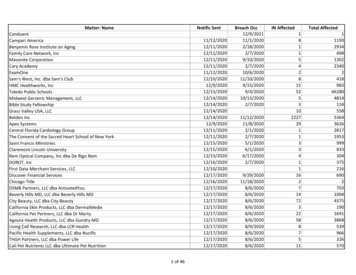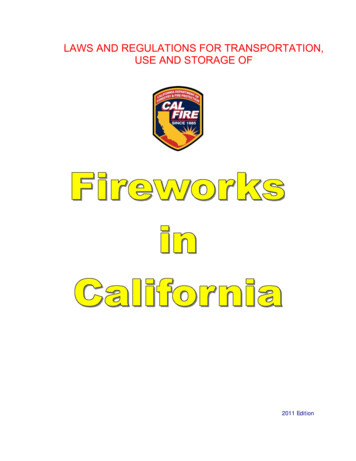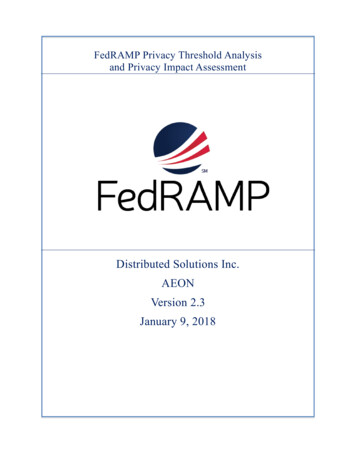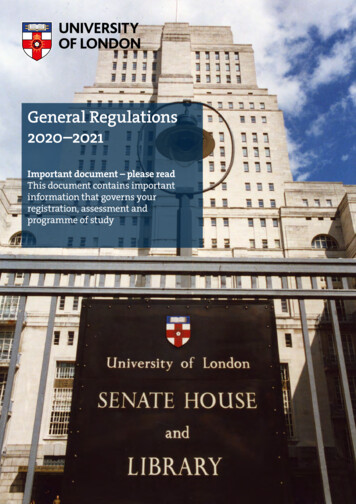
Transcription
General Regulations2020–2021Important document – please readThis document contains importantinformation that governs yourregistration, assessment andprogramme of study
University of London General Regulations 2020-2021ContentsSignificant changes made to General Regulations 2020-2021. 2About the University of London General Regulations 2020-2021 . 31Registration . 52Transfer of registration . 63Recognition of prior learning . 84Credit transfer . 105Assessment for the Programme . 106Taking an assessment . 127Rules for taking written examinations . 138Rules for coursework, projects and dissertations. 149Rules for taking online timed assessments. 1510 Assessment offences . 1611 Access requirements or disabilities . 1712 Mitigating circumstances . 1713 Administrative recheck of marks. 1714 Final award certificate and diploma supplement . 1815 Provision for the award of a qualification in exceptional circumstances . 1816 Complaints and Appeals . 1917 Suspension and termination of your registration by us . 19University of London1
University of London General Regulations 2020-2021Significant changes made to General Regulations 2020-2021Last revised May 20201. At 5, in About the University of London General Regulations 2020-2021, the additionof the definition of Terminating course of study.2. Revised wording at 1.7 for clarity.3. At 1.12 and 1.13, removal of the word ‘annual’ with regard to the continuingregistration process4. A new clause at 1.14 outlining when your registration terminates.5. At 2.1, an indication that programme regulations may indicate otherwise.6. At 2.5, addition of d) that you rescind any award you may have received, whererequired.7. At 2.8, an indication that programme regulations may indicate otherwise.8. At 5.6, clarification that this applies to all assessment tasks.9. At 9, a new section entitled ‘Rules for online timed assessment’ is added. Throughout5 and 11, references to online timed assessment have also been added.10. At 10.3, notice that proven assessment offences may be provided to the relevantprofessional or regulatory body.11. At 12.1, clarification that Programme Regulations may provide further information onthe submission of mitigating circumstances.12. At 14.6, notice that, where required, students may request a transcript.13. Throughout, some minor revisions to format and structure for enhanced clarity.University of London2
University of London General Regulations 2020-2021About the University of London General Regulations 2020-20211.These General Regulations are subject to the Statutes, Ordinances and Regulations ofthe University.2.Throughout the Regulations, ‘we’ ‘us’ and ‘our’ mean the University of London; ‘you’ and‘your’ mean the student, or where applicable, all students.3.General Regulations should be read in conjunction with your Programme Regulations,which are published on the website.4.The General Regulations and Programme Regulations are revised annually. You arebound by the regulations of the current Academic Year and not the Academic Year inwhich you initially registered.5.Where any words are capitalised throughout these General Regulations, they shall havethe meanings set out below.Academic Yearfor the purposes of this document, this means the period forwhich your Programme runs. An Academic Year may start inOctober or January of any given calendar year, and mayhave entry points throughout this period.University of LondonProcedure for StudentComplaints andAcademic Appealsmeans our academic appeals and complaints policy andprocedure.IntermediateQualificationmeans a qualification which you may study as you progressto a higher level qualification.Offermeans an offer of a place on a Programme.Programmemeans your prospective or registered programme of studywith the University of London.Programme FeesFees payable to the University which include, whereapplicable, registration fees, continuing registration fees,module/course fees, dissertation fees and assessment entryfees as indicated on our website. A full list of ProgrammeFees is available on our website.Study Sessionmeans a defined period of time allocated for the study of oneor more modules/courses.University of London3
University of London General Regulations 2020-2021University of LondonRecognised TeachingCentremeans a teaching centre that supports students studying forthe Programme and is recognised under the TeachingCentres Recognition Framework (TCRF).Terminating course ofstudyA course which you may register on as a stand-alonequalification. It may be the highest qualification or anIntermediate Qualification.6.Programme specifications and regulations may be revised during the time that you areregistered with us. If revisions are madea) we will give notice of at least one year if a module/course is permanently withdrawn,a syllabus is substantially revised, a new requisite for a module/course is introducedor the assessment method for a module/course changes; andb) we will give five years’ notice if a Programme is to be permanently withdrawn.7.On all matters where the regulations are to be interpreted, or are silent, our decision willbe final.University of London4
University of London General Regulations 2020-20211RegistrationEffective date of registration1.1We will give you an effective date of registration that will determine the date that you mayfirst enter for assessments and the time from which your period of registration will becounted.1.2Where a registration deadline is indicated for your Programme, you must complete yourinitial registration by the date specified. If you fail to do this, you may incur financial penaltiesor be required to defer your registration to the next point of entry. Registration deadlines forall programmes are published on the student portal.Period of registration1.3The maximum and minimum period of registration for your Programme is outlined in theProgramme Specification.1.4Where Programme Regulations allow you to interrupt or suspend your studies it is yourresponsibility to complete your studies within the maximum permitted period of registration.1.5We may allow you to extend your period of registration if you have not completed yourProgramme within the maximum period of registration. If we allow this we will review the currency of the modules/courses that you have completed anddecide whether the credit can contribute to your qualification; you will be responsible for any additional fees that become payable.1.6You are responsible for making sure that your choice of modules/courses is in line withcurrent regulations. You can only select from available modules/courses. Not allmodules/courses are offered every Academic Year or every Study Session.1.7Where there is good reason to believe the quality of the learning experience may becompromised, we may withdraw an elective (or option) module/course at short notice. Wherethis occurs we will continue, whenever possible, to offer a range of modules/courses fromwhich to choose; in all cases the number of modules/courses offered will not be fewer thanthe maximum required to progress.1.8If it is a condition of the Programme that you attend a recognised teaching centre, we will notassess you or consider you for an award if you have not satisfied that condition.University of London5
University of London General Regulations 2020-20211.9You can cancel your registration at any time. If you have entered for an assessment andthen cancel your registration, the cancellation will only take effect after the release of theassessment results for your Programme.1.10If you subsequently commence a new Programme you must pay all associated ProgrammeFees and any other costs. We will grant you the maximum period of registration relevant tothe new Programme.1.11We may refuse your application to register in a particular field of study.Confirmation of continuing study1.12When asked, you must complete the continuing registration process and pay anyappropriate fees, by the deadline for your Programme.1.13If, when asked, you fail to complete the continuing registration process by the deadline foryour Programme, you will not be able to enter for any written assessments during thatAcademic Year or Study Session, as applicable. If you decide at a later date to recommencethe Programme, any outstanding continuing registration fees, where applicable, will becomedue and a late registration penalty may be added.Termination of registration1.14Your registration, and therefore your status as a student, will cease if:a) You achieve the highest qualification offered through the Programme; or the qualification awarded through a terminating course of study; or you are awarded an exit qualification in line with the ProgrammeRegulations;b) The Board of Examiners confirms you are unable to meet the academicrequirements of the qualification offered through your terminating course of study;c) Your period of registration ends;d) You formally withdraw from the Programme;e) We formally cancel your registration.2Transfer of registration2.1If you successfully complete an individual module/course and you are eligible to transfer tothe associated Programme, on registration we will give you a new maximum period ofUniversity of London6
University of London General Regulations 2020-2021registration effective from the Academic Year that you transfer, unless programmeregulations indicate otherwise.2.2If you transfer your registration between qualifications or pathways in the same Programme,your maximum period of registration will continue to be counted from the effective date ofregistration we gave you when you initially registered on that Programme.2.3We will consider applications to transfer between Programmes. We will decide if you meetthe entrance requirements, your maximum period of registration and any Programme Feesthat apply.2.4If you have entered for an assessment and you then apply to transfer your registrationbetween Programmes or between qualifications or pathways within the same Programme,we will not consider your application until after release of the assessment results for yourProgramme.Progression within a Programme2.5You may progress to the next level within a Programme provideda)b)c)d)that you have met any academic requirements given in the ProgrammeRegulations;that you have sufficient time to complete the next level;that you pay any Programme Fees that apply; andwhere required, that you rescind any award you may have received.2.6If you progress to the next level within a Programme, your registration will be transferred tothe qualification that corresponds to that level. Your maximum period of registration willcontinue to be counted from the effective date of registration we gave you when you initiallyregistered on that Programme.2.7If you progress from a lower level qualification to a higher level qualification, assessmentattempts made for a module/course at the lower level qualification will normally counttowards the maximum number of attempts permitted for that module/course.2.8If we allow you to transfer your registration to a higher level award without completing therequirements for the lower level award, then you will not receive the lower award, unlessProgramme Regulations indicate otherwise.2.9Programme Regulations indicate whether Intermediate Qualifications are awarded, and thecircumstances under which this may occur.University of London7
University of London General Regulations 2020-2021Transferring your registration2.10If you are registered at a member institution you may apply to complete your studies for thesame or similar qualification by transferring and registering for a Programme with us.2.11If we allow you to transfer and register with us, we will review the currency and coherence ofthe modules/courses that you have completed and decide whether to grant you credit forthem.2.12If we allow you to transfer and register with us, you will have to pay all the associatedProgramme Fees and other costs.3Recognition of prior learningRecognition of prior learning (RPL) is a generic term for the process by which werecognise and, where appropriate, award credit for learning that has taken place at theUniversity of London, or elsewhere, before entry onto a programme of study.3.1If recognition of prior learning is permitted for a Programme, it will be stated in theProgramme Regulations.3.2Recognition of prior learning will be considered on the basis of regulations in effect at thetime of your application and will be approved at our discretion.3.3Prior learning will only be considered if you satisfy the entrance requirements for theProgramme concerned. Where commencement on a programme of study is subject toadditional conditions, the decision with regard to the prior learning may be delayed until theadditional conditions have been met.3.4Where recognition of prior learning is permitted, we will only consider prior certificatedlearning. This is learning which has been formally assessed by a recognised academicinstitution or professional body acceptable to us and for which you have been awarded aresulting qualification and/or credits.3.5Your prior learning may count towards a University of London qualification provided that:a) the academic/professional requirements for the previous study can be verified by us;b) the range, quality and currency of the previous study and/or of a previousqualification, and its coherence with the studies to be undertaken, is confirmed asappropriate;c) your prior learning was completed within the past five years, unless ProgrammeRegulations indicate otherwise;University of London8
University of London General Regulations 2020-2021d) you apply in line with our written procedures and provide the necessary evidence;e) you have not already entered for the assessment in the module/course concerned;f) the period of registration and study with us shall be at least one third of the minimumperiod of study prescribed for the qualification concerned;g)at least one third of the total volume of credit is successfully completed with us;h) in all cases you undertake assessment at the final stage of the qualification, or finalassessment element.3.6Where prior learning is recognised, the decision to award credit (known as Accreditation ofprior learning (APL)) shall be made by an academic appointed by the Programme Director.Fees may be payable.3.7Where learning has taken place at a member institution of the University of London, or atone of its central academic bodies, the mark you received previously for the module/coursemay be carried forward to your record and may contribute towards the classification of yourqualification, in accordance with the scheme of award.3.8Prior learning will only be recognised against a whole, named module/course and not part ofa module/course.3.9If you withdraw from your Programme before completing it, prior learning that we haverecognised may count towards an exit qualification provided that:a) you have completed with us a minimum of one third of the credits required for thequalification;b) your Programme Regulations permit this.Provision for recognition of prior learning3.10An offer by us to recognise prior learning will be made in a confirmation letter and will bevalid:a) for a limited period of time. If you do not take an assessment within the period in theconfirmation letter, the offer will end and you will need to make a new application ifyou want prior learning to be recognised;b) for a module/course on a named Programme. If you transfer your registration toanother Programme you will be required to apply for recognition of prior learning forthe new Programme.3.11Your transcript will indicate the credit value for any module/course where prior learning hasbeen recognised. The mark awarded for the prior learning will not be recorded on yourtranscript and will not contribute towards classification of your qualification.University of London9
University of London General Regulations 2020-20213.12You may not register for a module/course which we have recognised and accredited as priorlearning unless you withdraw your request for recognition of prior learning.3.13If you fail the assessment for a module/course, you may not apply for recognition of priorlearning for that failed module/course at a later date.3.14We will not grant any credit for the successful completion of a non-credit bearing individualmodule/course.4Credit transfer4.1If you have successfully completed study at a member institution or through a centralacademic body of the University of London then we will consider transferring your credit toone of our programmes. If we allow you to transfer credit, the mark you received previouslyfor the module/course may be carried forward to your record and may contribute towards theclassification of your award, in accordance with the scheme of award.4.2Credit transfer will be considered on the basis of regulations in effect at the time of theapplication and will be granted at our discretion.4.3The final transcript that we produce for you will detail the modules/courses for which youreceived credit, the year in which this credit was awarded and, where appropriate, the markobtained.5Assessment for the Programme5.1Assessment refers to any means we use to assess your ability against the learningoutcomes. Assessment tasks may include, but are not limited to, timed written examination,online timed assessment, coursework, project, dissertation and required online participationand activities.5.2Unless otherwise stated by the Programme Regulations, you must be the sole author of anywork you submit for assessment.5.3We reserve the right to require you to complete an oral examination in order to confirm thatwork submitted by you for assessment is your own.5.4An assessment task is governed by the regulations in force at the time that you take theassessment.5.5Where you are required to make an assessment entry in order toUniversity of London10
University of London General Regulations 2020-2021a) sit for a written examination, you must do so in accordance with the assessmententry deadlines. Dates will vary for each Programme and will be published on thestudent portal.b) submit coursework, you must do so in accordance with the assessment entrydeadlines. Dates will vary for each Programme and will be published on the VLE.5.6Answers to all assessment tasks, whether written or oral, must be given in English unlessour instructions for a specific module/course allow a different language to be used.5.7When completing a timed written examination, or submitting handwritten answers as part ofan online timed assessment, handwriting must be legible. Examiners will not award marksfor writing which they cannot read.5.8All assessment tasks remain the property of the University. These may include, but are notlimited to, written examination answers, coursework and projects. We will not return scriptsor any other work to you.5.9You must take written examinations at one of the examination centres listed by us asauthorised to conduct our examinations.5.10You must apply to your chosen examination centre for permission to sit a writtenexamination with them. We are unable to make local examination arrangements for you.5.11Students in the same region will normally take the same written examination on the samedate at the same local time. However, we have the right to set different written examinationsfor the same module/course for students sitting in the same region or in different regions.5.12We have the right not to mark:a) a written examination paper taken at a different time from the time we set; orb) assessment tasks received later than instructed.5.13You will normally be notified of any change to the format or the rubric of any assessment,but, exceptionally, it may be necessary to change the format or the rubric of an assessmenttask without giving notice.Number of attempts permittedSee your Programme Regulations for more detailed information about assessmentUniversity of London11
University of London General Regulations 2020-20215.14If you have not yet met the conditions for the award of a qualification, you can resit a failedassessment up to the permitted maximum number of attempts, as long as your registrationhas not expired.5.15As soon as you enter the examination hall for a written examination, or access a timedonline assessment, this counts as an assessment attempt.5.16If you do not attend a written examination, or do not access an online timed assessment, thiswill not count as an attempt, unless Programme Regulations indicate otherwise.5.17If you fail to keep to the instructions for the assessment task, including but not limited tomeeting submission dates and complying with word counts, a penalty may apply or theassessment task may not be accepted. This would count as an attempt, unless ProgrammeRegulations indicate otherwise.5.18No refunds are provided for examinations or assessment tasks that are not attempted.5.19You will not be allowed to resubmit assessment tasks or resit written examinations formodules/courses that you have already passed or for which credit has been awarded, unlessProgramme Regulations indicate otherwise.5.20The result you get for your most recent attempt at an assessment task will replace any markor grade you were previously awarded for that task, unless Programme Regulations indicateotherwise. All your confirmed marks will appear on your transcript.5.21If you fail the overall assessment of any compulsory or required core module/course at thefinal attempt, your registration for that Programme will end unless the Board of Examiners, orProgramme Regulations, allow otherwise.6Taking an assessment6.1To enter for an assessment in any given Academic Year or Study Session, you must have:a) registered for the relevant Programme and module/course;b) kept to our regulations and assessment entry instructions and deadlines;c) kept to the instructions provided for the assessment tasks;d) paid all relevant Programme Fees, as required, both to us and to your examinationcentre.University of London12
University of London General Regulations 2020-20217Rules for taking written examinations7.1Failure to comply with the following, either intentionally or unintentionally, will be deemed anassessment offence and will be dealt with as set out in 10.1 below.7.2Written examinations must be taken under the conditions prescribed by us. This includes,but is not limited to, being taken under the conditions described below, on the date specifiedby us and within the given time limits.7.3You must:a) keep to the instructions in the Admission Notice, Notice to Candidates, Rules forExaminations and, where it applies, the Permitted Materials List;b) keep to any reasonable instructions or requirements given by examination centrestaff;c) keep to any revised arrangements that we may agree with examination centre staff;d) ensure that your Admission Notice and identification documents are kept safe andpresented to examination centre staff or officials for the purposes of identificationonly.7.4You must not:a) have in your possession, or have access to, any materials or aids which are notpermitted during the examination. This includes but is not limited to, notes, mobilephones, tablets or electronic devices and materials that are allowed but which havebeen amended or annotated;b) engage in conduct that causes a disturbance. Violent, indecent, disorderly,threatening or offensive behaviour or language used during an examination may betreated as a disciplinary matter under Ordinance 17: Code of Student Discipline;c) exchange any information with another student during an examination. This includes,but is not limited to, speaking, gesturing, passing notes, copying or allowing yourwork to be copied;d) engage in any discussion about an examination paper in such a way that yourself oranother student who has yet to sit the paper may be advantaged. This includes, butis not limited to, online discussions;e) take stationery or other materials from the venue in which the examination is held.This includes, but is not limited to, question papers and supplementary answerbooks.University of London13
University of London General Regulations 2020-2021Materials and aids allowed in the examination room7.5Unless you are told otherwise, the only materials you must enter the examination room withare your Admission Notice, Photo ID and pens. You will be informed in advance by us if anyfurther materials (for example, statute books or calculators) are permitted.Calculators7.6The use of calculators during the examination is strictly controlled. Where use of a calculatoris allowed, the detailed specification is given on the Permitted Materials List.7.7We will not provide calculators. You are responsible for providing a working calculator andfor making sure that it meets the conditions set out in the Permitted Materials List.7.8You are not allowed to borrow another student’s calculator during the examination.7.9If you use a calculator in an examination, you must write on your examination script thename and type of calculator you used.8Rules for coursework, projects and dissertations8.1All work which you submit for assessment must be your own, expressed in your own wordsand include your own ideas and judgements. By submitting work for assessment you confirmthat the work is entirely your own, that you have acknowledged the work of other peoplewithin your submission, in line with our requirements, and that you understand what is meantby plagiarism and self-plagiarism.Referencing8.2Direct use of another person’s work must always be clearly identified, for example, throughthe use of quotation marks or indentation of quoted text. You must also provide a fullreference to the source, wherever direct use of another person’s work appears.Another person’s work includes any source that is published or unpublished, includingwords, images, diagrams, formulae, audio recordings, computer code, ideas andjudgements, discoveries and results8.3If you summarise any person’s ideas or judgements, you must credit that person in the textand give full details of the work you have summarised in a proper form.Plagiarism8.4Plagiarism is the intentional or unintentional use of somebody else’s work, when it is notproperly referenced, as described above, and is therefore presented as your own.University of London14
University of London General Regulations 2020-20218.5Submitting work which has been written by someone else at your request, either in full orpart, is contract cheating. This remains the case whether you have made payment for thisservice or not. Contract cheating is a form of plagiarism.8.6Plagiarism is an assessment offence and will be dealt with as set out in 10.1 below.Self-plagiarism8.7You must not submit a significant part of the same piece of work more than once, unlessyour Programme Regulations permit you to do so. This includes, but is not limited to:assignments, essays, projects, reports, papers, dissertations and other work which you havesubmitted previously for the same module/course, for another module/course, programme orinstitution, or for publication.8.8Submitting the same piece of work twice is ‘self-plagiarism’, which is an assessment offenceand will be dealt with as set out in 9.1 below.Collusion8.9Unless permitted by the Programme Regulations, you must not submit work which has beenwritten jointly by two or more people.8.10Where two, or more, people submit identical or substantially similar pieces of work, this willbe treated as an assessment offence and will be dealt with as set out in 9.1. You areresponsible for protecting your own work and for preventing other students from copyingfrom you.9Rules for taking online timed assessments.Online timed assessments may be used on occasions when it is not possible to scheduleor run written examinations as planned. If this happens you will be informed in advanceand provided with additional guidance and information.9.1Online timed assessments must be taken on the date(s) specified by us, within the timelimits and under the conditions given in your Admission Notice, Notice to Candidates, Rulesfor Online Timed Assessment and, where applicable, Permitted Materials List. Thesedocuments will be provided to you in advance of the assessment.9.2You must also follow the detailed instructions provided at the time of each assessment.9.3All work which you submit for assessment must be your own, expressed in your own wordsand include your own ideas and judgements. By submitting wo
University of London 2 University of London General Regulations 2020-2021 Significant changes made to General Regulations 2020-2021 Last revised May 2020 1. At 5, in About the University of London General Regulations 2020-2021, the addition of the definition of Terminating course of study. 2. Revised wording at 1.7 for clarity. 3.

